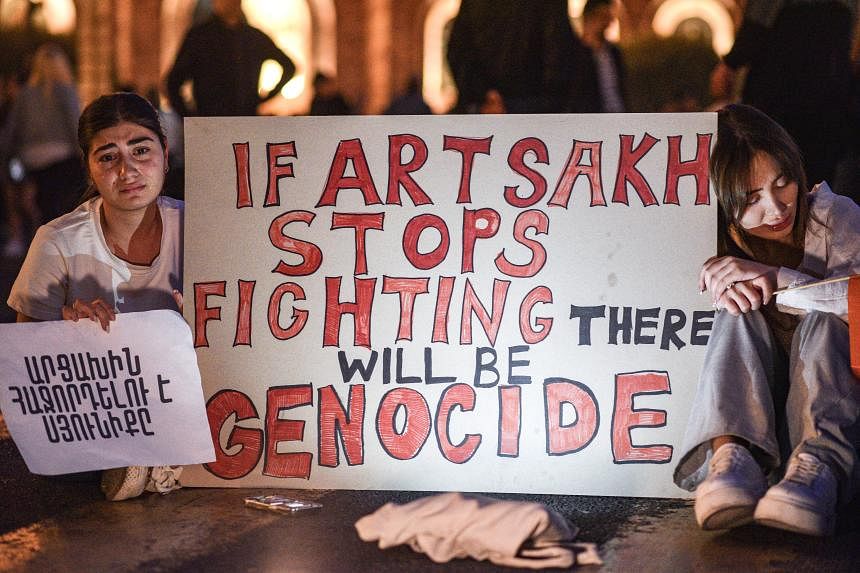
LONDON – Russia was instrumental in brokering a ceasefire between Azerbaijan and Armenia, which earlier this week threatened to flare up into another substantial all-out war on Europe’s south-eastern edges.
The Russians, who have approximately 12,000 troops deployed in the region, are also helping with the peace negotiations between the two warring parties.
Yet despite its high-profile involvement, Russia remains the biggest loser from the current flare-up since the clash between Azerbaijan and Armenia indicates just how weakened the Russians are due to their botched military invasion of Ukraine.
The ancient nations of Armenia and Azerbaijan regained their independence with the collapse of the Soviet Union in 1991, but they remained locked in confrontation ever since.
The confrontation between the two neighbours centres on the fate of Nagorno-Karabakh, a landlocked mountainous region of Azerbaijan, home to around 120,000 ethnic Armenians.
Even before the Soviet Union disintegrated, the Armenians in Nagorno-Karabakh declared secession from Azerbaijan. Although the international community never recognised this, Nagorno-Karabakh functioned as a de facto independent state over the past three decades, openly supported by Armenia.
Like other so-called “frozen conflicts” in the former Soviet space, the dispute over Nagorno-Karabakh lasted so long because this suited Russia since it allowed Russian leaders to maintain their influence in the region.
Until recently, Armenia was backed to the hilt by Russia, and the Russians also retained critical military bases in the country.
So, although Azerbaijan, blessed with significant oil and natural gas reserves, was far more prosperous than Armenia, it could do little to regain control of its entire territory.
Over the past 30 years, Armenian separatists – with Russia’s tacit backing – refused any compromise with Azerbaijan and increased their occupation of Azeri territory.
However, Turkey’s decision to enter the fray changed the strategic balance. The Azeris are close to the Turks in ethnicity and language, so the entire Turkish political spectrum supported Turkish President Recep Tayyip Erdogan’s decision to train and equip Azerbaijan’s military.
Mr Erdogan’s strategy was spectacularly successful.
In lightning strikes in 2020, a reformed and revitalised Azeri military inflicted serious blows on Armenia without attracting any reaction from the Russians, who were then distracted by their military deployments in neighbouring Syria and their growing confrontation with the West.
And since the Russians got bogged down in Ukraine in 2022, everyone in the region knew that it was only a matter of time before the Azeris struck again, with the objective of crushing the Nagorno-Karabakh rebels altogether.
The enclave was under an Azeri economic blockade for months, so it was in no position to defend itself when the offensive duly started this week. Armenia itself was powerless to act. And the Russian military did nothing, even when one of Russia’s military posts was bombed.
The result is, in effect, the capitulation of the Armenian separatists in Nagorno-Karabakh.
The ceasefire agreement the Russians brokered includes the promise of complete disarmament of Nagorno-Karabakh’s military formations, the dissolution of their quasi-state structures, and talks to “reintegrate” the region into Azerbaijan.
Azerbaijani President Ilham Aliyev rejects accusations that the Armenians in the enclave now face expulsion. “The Armenian population in Karabakh can now breathe easy. They are our citizens; we have no hostility toward them”, Mr Aliyev said in a televised address to his nation.
But there was no doubt about his triumph.
“Azerbaijan’s sovereignty is restored in the region,” Mr Aliyev added.
There was also no doubt about the scale of the Russian defeat.
Although Russian officials are trying to deflect blame by accusing the Armenian government of abandoning Nagorno-Karabakh, the fact remains that, by ordering its troops on the ground to steer clear of any involvement, Moscow has now publicly admitted that it has neither the time nor the resources to defend Armenia, its regional proxy.
And the Russians’ hold over the region seems destined to continue unravelling.
It is doubtful that Armenian Prime Minister Nikol Pashinyan, now accused of wantonly sacrificing Nagorno-Karabakh, will survive the domestic backlash which will surely follow this week’s events. Calls for a coup or a revolution are already in the air in Yerevan, the Armenian capital.
But even if he survives, Mr Pashinyan will face calls to distance himself from Russia.
Keen to restore his credibility, Russian President Vladimir Putin is rushing to remind everyone that the future negotiations over the implementation of the ceasefire agreement between Armenia and Azerbaijan will be led by Moscow.
“These negotiations will take place with the mediation of the leadership of the Russian peacekeeping contingent,” Mr Putin said.
But it is obvious that the real masters of the region are now the Azeri and their Turkish backers.
Yet another reminder of the massive strategic cost Russia has to bear for its Ukraine adventure.
